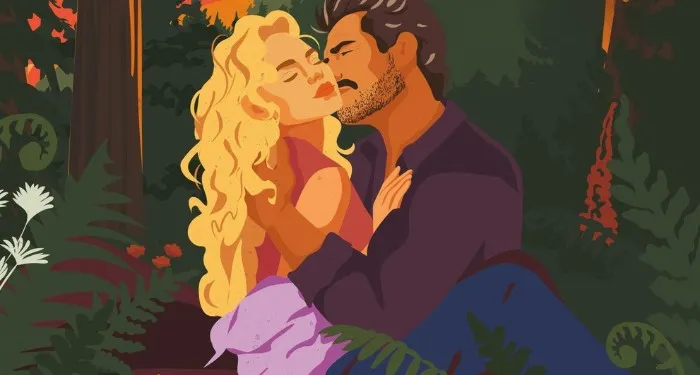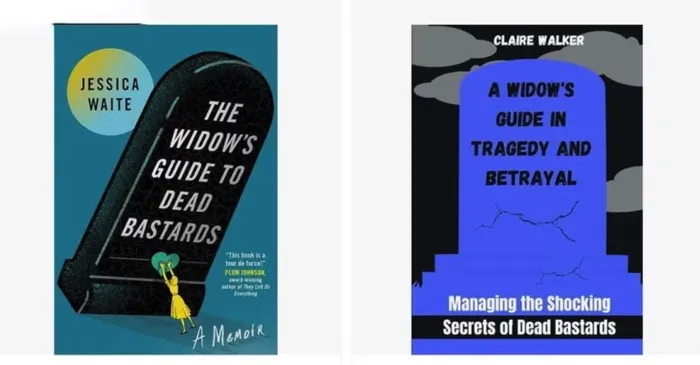This guest review comes from Lucynka! Lucynka is a long-time lurker, who has occasionally commented under a couple different names in the past. Over the last few years, she’s become really interested in the history of the romance genre, particularly those forgotten or oft-overlooked parts. You can find her on Bluesky @lucynka.bsky.social, or else over on her WordPress, where she blogs about “obscure bullshit,” including a lot of romance pulp magazines from the 1920s-’40s.
…
First of all, a big thanks to Heather S and her Half Price Books excursion for putting this book on my radar. While all of the books featured in that post were solid gold in their own ways, The Lilac Ghost caught my eye specifically because 1.) that is indeed a very pretty cover, and 2.) who doesn’t love a ghost? The (even briefer) cover copy for the 1972 reprint even promised that it was “a very romantic ghost”!
Combine that with the fact that I was having A Week™, and, well, I decided to take a chance and treat myself to the more reasonably-priced of two copies that I managed to find online. These vintage Gothics tend to come in one of three flavors—good, bad, or bonkers—so even though 1970 is actually way later than my usual wheelhouse, I was in need of a nice mental distraction, and thus hoped that even if it wasn’t good, it would at least fall into that “bonkers” territory.
And readers? To my delight, it was about 50% bonkers, 50% genuinely good and suspenseful, and 100% entertaining. And just in case you need a refresher before we dive in, the cover copy:
After a whirlwind courtship at sea, Virginia had married Rick Bradley and gone with him to his ancestral home, an isolated house perched on the peak of a mountain and shunned by villagers and tradesmen. Now, after three weeks, Rick had gone off without warning, leaving his wife alone in a raging storm, with no company save a few women and the lilac ghost of Bradley Hall. And the ghost which walked the garden by the lilac bush was hardly reassuring.
My favorite part of The Lilac Ghost is probably the beginning, as the author wastes no time and just throws you right into the deep end.
Do we get a chapter showing the heroine’s “whirlwind courtship”?
Do we even get a scene where Virginia discovers her husband’s note, unceremoniously letting her know that he had to disappear on Sudden Business™?
NO! Straight away, they’re already married, he’s already left, and the wind is already howling as Virginia writes a letter to her twin sister, Carol. (Yesss, Ms. Saylor! Give the readers what they want!)
Now, much like Chekhov’s Gun, I’m a firm believer in the idea that if you introduce a twin in a story, they’d better metaphorically go off at some point. As such, I am pleased to report that sister Carol does indeed go off later. But also…
Show Spoiler
…the fact that she’s Virginia’s identical twin never really factors into anything? Like, there’s a token scene where another character is like, “WTF, Virginia—I just saw you in a bar an hour ago!” presumably to foreshadow to the reader that something might be up, but that’s it.
Carol never impersonates Virginia, nor does Virginia ever get mistaken for Carol and thus get told something she wasn’t supposed to know, etc. There is effectively nothing to stop them from just being plain, regular-degular sisters, and the story might even make more sense if they didn’t look exactly the same?
The fact that the author was still like, “NAH, IT’S TWIN TIME, BABY,” in the face of all this is a move I kind of have to respect.
Anyway, Virginia’s writing a letter to her sister, but a storm is raging! The wind blows the fancy French doors of the library open, and as she gets up to close them, she’s distracted by a lightning strike and a subsequent flash of fire in the distance, down the mountainside. Will she and the three maids, and Rick’s unmarried aunt Cordelia, have to abandon the mansion and flee for their lives???
Heads up - Mild flashing lights on this gif

No! Because just then “a strong, wiry, muscular, masculine hand” grabs her wrist, pulls her out onto the terrace, into a man’s arms, and he kisses her!
It’s Rick!
But no—Rick never kissed her so passionately, so possessively, and Rick has green eyes, not blue! Who the fuck is this ardent stranger who looks so uncannily like her husband???
The man is “mocking” and “satiric,” all, “Didn’t they tell you about me, Virginia~? Aren’t you going to invite Rick’s favorite cousin in before he catches pneumonia~?” He’s giving off big “mad relative in the attic” vibes, and you, like me, might find yourself wondering, “Omg, is this the titular ‘ghost’???”
FOOLS! You, like me, would be wrong then, because just then the actual ghost appears! A spooky vision in white, out near the lilac bush, that disappears into the garden! Virginia uses the supernatural distraction to get away from this sexy, frightening stranger, and—not trusting that he’s necessarily who he says he is—locks the French doors against him. She then sensibly realizes that this potential madman isn’t likely to give up so easily, and she manages to get the front door bolted just in time to thwart him. He pounds on the door as Virginia tries to think of any other possible entrances she needs to shore up, but then there’s a thud and a woman’s scream that reverberates from the second floor. For reference, we are a mere seven pages into this book.
Show Spoiler

Chapter two opens with the line, “I charged up the stairs like a woman zeroing in on a nylon stocking bargain day sale”—which is admittedly not as good as, “Kaliq dismounted with the same speed and grace as he would remove himself from the body of a woman he had just made love to,” but it’s still pretty up there, imo.
Virginia checks on Aunt Cordelia, only to find her so sound asleep she’s damn near comically snoring, which means the scream probably came from the maids’ quarters. As Virginia makes her way toward them, however, she sees a flash of white around a corner. Omg, the ghost is now inside!
Virginia, herself, screams, at which point two of the maids come running—senior maid Rilla and subordinate Suz. We then get this fantastically dumb and melodramatic exchange:
“The ghost walks!” I burst out.
Suz clutched at Rilla’s arm. “She always walks when death strikes!”
“Be still!” Rilla snapped.
The maid’s frightening words somehow had the effect of bringing me to my senses. I straightened.
“There are no ghosts,” I said in my no-nonsense secretarial tone of voice.
BITCH, YOU LITERALLY JUST SAID IT WALKS. PICK A LANE, VIRGINIA.
Anyway, it’s determined that the initial scream came from Kathy, the youngest maid. She saw the ghost, screamed and sprained her ankle in her ensuing panic, and now she’s sobbing her heart out as only a sixteen-year-old girl can, because she won’t be able to keep her date with a fella.
It turns out Kathy wrote a poem, got it published in a magazine, at which point an admirer of the poem wrote to her and they struck up a correspondence. They were supposed to finally meet at the railroad station tomorrow, as he’s coming in on an afternoon train, but now that plan’s obviously fucked.
Oh, and the guy’s name is supposedly Alan Dale (like Alan-a-Dale, from the tale of Robin Hood), and Kathy told him she’s the illegitimate daughter of an aristocratic family because she was ashamed of being a mere maid. Virginia is like, “Jfc, Kathy!”
Show Spoiler

I wished I could meet the man. I most certainly would give him a piece of my mind, trying to take advantage of a naive sixteen-year-old girl.
As an aside, we never find out exactly how old Virginia is (my guess is early- to mid-twenties?), but it’s worth noting that I actually quite like her as a heroine. She’s admittedly something of a cipher (she has a twin sister, worked as a secretary in a publishing house before her marriage, and that’s about all we ever learn of her), but she generally has a good, sensible head on her shoulders, which makes it pretty easy to root for her.
Her voice isn’t so distinct that the story really needed to be told from her first-person POV, but I at least never got tired of being literally stuck in her head, and while there are some irritatingly of-its-time gender politics at play, where Virginia feels it’s only right to defer to a man in certain situations, for the most part I feel she holds up relatively well to modern reading (see: the above situation with Kathy).
Anyway, with the upstairs drama having since been sorted out (Virginia decides she’ll meet Kathy’s mystery man at the train station herself tomorrow, to suss him out), and with the rain thankfully in the process of letting up, our heroine returns to the library to finish her letter to her sister. But there’s one loose end she forgot to tie up, and as such, she’s stopped dead in her tracks by the sight of her handsome terrace intruder casually sitting at her desk, seemingly waiting for her.
She’s like, “Holy shit, how did you get in?” and he merely lifts up some keys and says, “Through the front door.” It turns out he really is Rick’s cousin Jeff (the reactions of both Aunt Cordelia and the maids later confirm this), and he sets about to catching Virginia as she almost faints, then serves her some coffee while she recovers from everything that has happened since the first page.
Now, you might find yourself asking here: if Jeff had keys to the place and could get in at any time, then why the hell was he skulking around on the terrace in the rain, practically cackling like a madman, and the only answer I can give you is, “Idk, for drama???”
For that matter, why did he passionately smooch a woman he knew to be his cousin’s wife?
The explanation he gives is that Virginia “looked very kissable”—which is both a shit reason to effectively assault someone, and (as we’ll come to realize) strangely out of character, as well; for all that he was introduced like some crazy black sheep of the family, Jeff presents from here on out as a surprisingly normal and more or less respectful guy. I kept waiting for him to again get all handsy and kissy with Virginia as the book progressed, and to my amazement it never really happened.
Show Spoiler
Well, not until the end, but that’s more of an understandable, heat-of-the-moment love confession than anything.
Well, Virginia smells lilacs, Jeff goes back outside to investigate, the lights go out, and the telephone starts ringing. It’s Rick! He tells her he’ll be home tomorrow evening, and then, after she hangs up, Virginia gets attacked, and it becomes apparent that the lilac ghost—or at least this particular manifestation of it—is corporeal, after all. Virginia manages a scream, the “ghost” goes running, the lights come back on, and it’s then that Jeff reappears, this time with sourpuss Aunt Cordelia.
As Rick clearly couldn’t be bothered to inform Virginia of the Greater Bradley Situation™ before fucking off, Jeff does her the favor and gets her up to speed. It’s here that we get the main thrust of the story, which (contrary to what the cover copy and the first couple chapters might have indicated) is not actually about melodramatic happenings in the middle of a storm, but is in fact all about inheritance issues.
Show Spoiler

Basically, back in the day, Grandpa Bradley built the family fortune and had five children—three boys and two girls. Of the boys, oldest son Samuel begat Rick, and Nicholas begat Jeff.
Cordelia was the “good daughter,” with a head for business, who never married, and the other daughter Rosamunde was the wild one, the family beauty and flirt, who died under mysterious circumstances fifteen years ago: she was found at the bottom of the local waterfall with a broken neck, and while it was officially deemed an accident, there’s always been the lingering suspicion that she was pushed, either by a jealous lover or a disapproving family member. Supposedly the lilac ghost is Rosamunde’s spirit, looking for her murderer; she seems to show up every year in May, around the anniversary of her death.
There were rumors that Rosamunde might have had a child before she died, and so Grandpa in turn tied up her ten million dollar inheritance before he died, with the stipulation that if no heir was found within fifteen years, then the money would be divided among the remaining relatives. And, well, that fifteen year mark just passed, which is actually—as we later find out—related to why Rick had to leave so goddamn abruptly before the start of the story (and, coincidentally, why Jeff suddenly arrived).
Further complicating matters is that around the time of Rosamunde’s death, hitherto unmentioned third son Stan was like, “FUCK THIS FAMILY,” and ran away to sea. It is unknown whether he’s still alive, married, had any children, or whatever. And sure enough, glamorous Elaine and her teenage son Vern show up, claiming to be his widow and child, which would entitle them not only to Stan’s money, still sitting unused in a New York City bank, but to a quarter of Rosamunde’s.
It’s here that we get the legit good part of the book, as the story goes from being crazy, over-the-top Gothic shenanigans, and instead turns into a pretty solid and suspenseful mystery, as Virginia inadvertently finds herself roped into this mess as Rick’s legally wedded wife—or his potential widow, as the case may be. After all, the fewer surviving family members there are means there’s that much more money to go around, and clearly somebody is out for blood—the only question is who?
Furthermore, what about the lilac ghost?
Show Spoiler

Is it really Rosamunde’s spirit, trying to find her killer?
Someone simply taking advantage of the family legend for their own nefarious purposes?
Or is Rosamunde—somehow, miraculously—still alive and wreaking regular, non-paranormal vengeance?
So it’s good fun, with genuinely good pacing and misdirections, and it kept me genuinely riveted to the pages. I even…
Show Spoiler
…started to wonder if Virginia (and by extension her sister) were actually related to the Bradleys. Like, they’re presumably too old to be Rosamunde’s child(ren), but for a while it was looking like they could maybe, unknowingly, be Stan’s? Did Rick marry his first cousin, perhaps on purpose in an attempt to consolidate the family wealth? (And consequently, does Jeff now have the hots not just for an in-law, but for an actual blood relation?) The story never actually goes down such weird, incestuous paths, but the fact that I wondered for a while if it would is a point in its favor, imo.
Where The Lilac Ghost falls down, however (or else goes back to being wonderfully, hilariously unhinged, depending on how you feel about these things), is the end:
Show Spoiler
After Virginia, herself, gets thrown over the falls in an attempt to kill her, it’s revealed pretty much out of the blue that her sister Carol has been in cahoots with Rick for literal years. It was she who was playing the part of the lilac ghost and otherwise doing things behind the scenes—the idea being that they’d secure Rosamunde’s inheritance solely for Rick, and then marry, which would give Carol legal access to the Bradley millions.
Rick’s notorious womanizing ways and his suddenly getting married while on a cruise fucked that up, though—especially when it turned out that his new wife was Carol’s sister. This is where the whole twin thing really makes no sense, because you’d think Rick would have recognized the familial relation upon first meeting Virginia (SHE AND CAROL LITERALLY LOOK EXACTLY ALIKE), and thus would have, yanno, gotten a hold of his bad self and not married her?
Like, it really would be better for the narrative if they’d just been regular sisters, and Rick only realized the relation after the fact.
As for why Rick married Virginia in the first place? It’s never adequately explained, but Jeff surmises that he might have genuinely fallen in love with her, if only for a short while (and presumably been too arrogant to worry about how this might throw a wrench into his well-laid murder plans and also piss off his romantic partner-in-crime).
Furthermore…
Show Spoiler
…Elaine turns out to be a red-herring, as it’s revealed she actually was Stan’s wife—it’s her “son,” Vern, who isn’t what he seems, as he’s actually Rosamunde’s long-lost love-child.
And the father? Elaine’s own father, Lew Whittaker, who runs the town general store and who was having an extra-marital affair with Rosamunde back in the day. Lew and his wife had been raising the boy as their own when Grandpa Bradley started searching for the kid, and rather than let him fall into this fucked-up rich family’s hands, Lew paid Elaine and Stan to take him away and care for him.
WHAT DRAMA, AMIRITE? Messy enough for Jerry Springer, for sure.
Oh, and also…
TW for suicide
…after the jig is up, Rick shoots himself rather than face charges, and this information is delivered so matter-of-factly at the start of the last chapter that I literally stopped and flipped back to make sure my copy wasn’t missing any pages.

So it isn’t perfect.
Technically-speaking, it has a weak end and some definite plot holes—one of my favorites being when Virginia finds a begonia plant in the hospital trash (it had been sent to Rick while he recovered from some injuries) and there’s mention of the card slipping between the outer paper and the pot; you expect that this card will later serve as some dramatic reveal, like maybe the name of the person who sent it will be important, but nope—the begonia plant gets metaphorically dropped and is never returned to. (*Muah* chef’s kiss, I love it.)
But for all its arguable flaws, I do think the good outweighs the bad here—or at least the entertaining outweighs the irritating. (It kept me obsessively turning the pages, so clearly it was doing something right, yeah?) Like most of these vintage Gothics, the emphasis is on the mystery and suspense far more than the romance (the romance is effectively reduced to a subplot), but as a subplot it worked for me, and—weak end aside—I’d still dub it an above-average example of its subgenre.
Unfortunately, it seems to be a pretty hard title to come by these days, but if it sounds like your jam and you happen to run across a copy in the wild, I do indeed recommend picking it up.
Someone you know wants to read this, right?



















 English (US) ·
English (US) ·